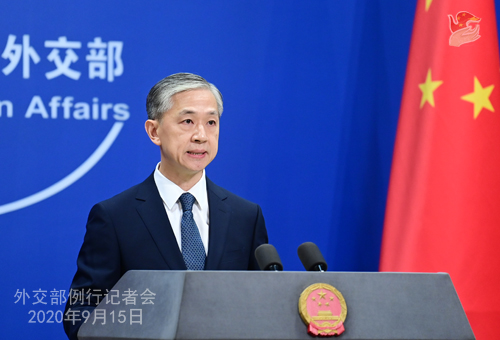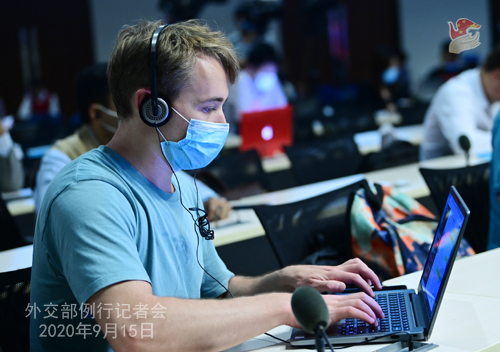| Foreign Ministry Spokesperson Wang Wenbin's Regular Press Conference on September 15, 2020 |
| 2020-09-15 23:01 |
|
CCTV: How does China view the China-Germany-EU leaders’ meeting held last night via videolink? Can you talk a bit about the outcomes and China-EU relations going forward? Wang Wenbin: On the night of September 14, President Xi Jinping held a meeting via videoconference with German Chancellor Angela Merkel, President Charles Michel of the European Council & President Ursula von der Leyen of the European Commission. It was an important meeting of the highest-level exchange between China and the EU within this year, and major strategic communication amid the COVID-19 pandemic and other major changes in the world unseen in a century. During the meeting, Chinese, German and EU leaders had in-depth exchange of views on China-EU relations and bilateral talks and cooperation in economic and trade, green, digital, anti-epidemic and other areas. The leaders made plans for China-EU relations going forward, identified key areas, agreed on closer communication, coordination and cooperation to ensure the success of major political agenda between the two sides, and pledged to deepen mutual trust, work for win-win results and elevate China-EU relations to a higher level. President Xi Jinping said it is important for China and the EU to adhere to four principles, namely peaceful coexistence, openness and cooperation, multilateralism, and dialogue and consultation, which was positively responded to by European leaders. A series of important outcomes were achieved at this meeting. First, the two sides officially signed the China-EU agreement on geographical indications. It demonstrates our commitment to free and open trade and the rules-based multilateral trading system, which will inject new vitality into bilateral economic and trade cooperation. Second, the two sides confirmed major progress made in the bilateral investment treaty talks and reaffirmed the political resolve to conclude the talks within this year. It serves as a strategic guidance for future BIT negotiations and sends out a signal of determination and confidence. Third, the two sides agreed to establish a China-EU High Level Environment and Climate Dialogue and a China-EU High Level Digital Cooperation Dialogue, and to forge China-EU green and digital partnerships. It will be another positive signal of China and the EU joining hands to address climate change and move forward digital cooperation. Fourth, the two sides support and practice multilateralism, strengthen global cooperation against the virus, contribute to world economic recovery, handle global challenges and advance political settlement of regional and international hotspots. It is natural that China and the EU, with different history, cultures, social systems and development stages, have differences on some issues, which won’t and shouldn’t affect our dialogue and cooperation. Based on the principles of equality and mutual respect, the two sides agreed to enhance communication and mutual understanding, expand common ground while properly managing differences, stick to the China-EU comprehensive strategic partnership, and grasp the mainstream of China-EU relations and the key feature of win-win results. In the next stage, China will implement the important consensus and outcomes of this meeting, advance the sound and stable development of China-EU comprehensive strategic partnership while keeping to peaceful co-existence, openness, cooperation, multilateralism, dialogue and consultation, and inject greater positive energy into the international efforts to fight the virus, recover the economy and uphold justice. The Global Times: The European side announced that the EU-China Summit is expected to be held in 2021, which will be attended by President Xi Jinping and leaders from EU members. Can you confirm that? Wang Wenbin: Since the beginning of this year, China and the EU have maintained the momentum of close high-level exchanges. The two sides stay in communications and negotiations on the time, venue and form of important exchanges and activities in the next stage.
Reuters: India told Reuters that Chinese troops laid a network of optical fiber cables at the Pangong Tso Lake on the India-China border. Can you confirm? Another Indian official said that neither side has made significant troop withdrawals since last week’s foreign ministers’ meeting. What is your comment? Wang Wenbin: On your first question, as I understand, the relevant reports are not true. On your second question, when the foreign ministers of the two countries met in Moscow, they reached positive consensus on jointly de-escalating the situation and lowering the temperature along the China-India borders and agreed to continue close communications through military and diplomatic channels to solve the issue on the ground. We hope the Indian side will earnestly implement the consensus between the two foreign ministers and work with China to make concrete efforts for de-escalation. AFP: First, the US recently issued import restrictions on cotton products from Xinjiang due to allegations of “forced labor”. What is your comment? Second, at the EU-China summit recently, EU officials requested an independent visit to Xinjiang. Will this happen and can you give more details? Wang Wenbin: On your first question, under the pretext of the so-called "forced labor", the US has taken restrictive measures against relevant Chinese companies, which violates international trade rules and disrupts the global industrial chain, supply chain and value chain. It is a blatant act of bullying. China is firmly opposed to this. The so-called "forced labor" issue is completely fabricated by some western organizations and individuals, which totally run counter to the facts. The rights and interests of workers from ethnic minority groups in Xinjiang as part of China's large workforce are protected by law. There is no restriction whatsoever on their personal freedom. Their customs, religious beliefs and spoken and written language are all protected by law. How can anyone call this "forced labor"? Some in the US profess they care about ethnic minorities in Xinjiang, but at the same time they are taking all sorts of measures to repress Xinjiang enterprises. This inconsistency exposes their hypocrisy and malicious intention to contain Xinjiang's development and sow discord between different ethnic groups in China. We urge the US side to respect facts, overcome bias, stop political manipulation, and stop using the Xinjiang issue to disrupt normal economic and trade cooperation between Chinese and US companies. The Chinese side will continue to take all necessary measures to safeguard the legitimate rights and interests of Chinese companies. On your second question, the Chinese side already issued a readout on China-Germany-EU leaders’ meeting held yesterday. With regard to human rights, President Xi Jinping stressed that there is no universal path to human rights development in the world. In terms of human rights protection, there is no single best way, only the better one. All countries should priorly handle their own things. We believe the European side can find good solutions to its own human rights issues. Chinese people will not accept "an instructor" on human rights and oppose double standards. China is willing to strengthen exchanges with the European side based on the principle of mutual respect so that the two sides can both make progress. The human rights issues within the EU were also discussed at the meeting, such as the protracted refugee issue, repeated humanitarian crises, the rise of racism, extremism and the ethnic minority issue in some EU members, and the frequent occurrence of anti-Semitic, anti-Muslim and anti-black remarks and incidents. The EU side admitted its own problems and hoped to conduct dialogue with China based on the principle of equality and respect, enhance mutual understanding and properly handle differences and divisions. President Xi also expounded on China's principled position on issues related to Hong Kong and Xinjiang, pointing out that the essence of Hong Kong- and Xinjiang-related issues is about safeguarding China's national sovereignty, security and unity and protecting the rights of people of all ethnic groups to live a peaceful and happy life. China is firmly opposed to anyone and any force creating instability, division and unrest in China and to interference in China's internal affairs by any country. On the Xinjiang-related issues, we always welcome friends from all over the world, including the European side, to visit Xinjiang and see with their own eyes the real situation there, instead of believing fabricated lies or hearsay. The diplomatic envoys of the EU and its members in China said they wish to visit Xinjiang. China has agreed and is ready to make arrangements for that. Now the ball is in the European side’s court. At the same time, I must stress that we oppose any investigation with presumption of guilt.
Beijing Youth Daily: Climate change is an important area for China-EU cooperation. Could you give us more details on the discussion of climate change between President Xi Jinping and his German and EU counterparts? Wang Wenbin: At the China-Germany-EU leaders' meeting on September 14, President Xi Jinping pointed out that the two sides should forge China-EU green partnerships, participate constructively in the global multilateral process of tackling climate change and protecting global biodiversity. Climate change is a challenge faced by all. As the biggest developing country, China has actively implemented national climate change strategy and policies. After arduous efforts, it has accomplished the 2020 climate action targets as part of its major contributions to global response to climate change. China is willing to contribute more and we are now considering and studying a mid-century long-term vision for climate change, including such issues as the peaking of carbon dioxide emissions and carbon neutrality. Bloomberg: The US has updated its travel advisory for Hong Kong and other parts of China. The level-3 advisory is now in effect. At the same time, it warned the US citizens against risks of COVID-19 and arbitrary enforcement of local laws in China. Do you have a comment on this? Wang Wenbin: Since COVID-19 broke out, China has taken the most comprehensive, rigorous and thorough prevention and control measures and secured major strategic outcomes in the domestic fight against the virus. As of September 14, China’s mainland reports no newly confirmed local cases for 30 days. China protects the safety and legitimate rights and interests of foreign nationals in our country. China is one of the safest countries in the world. Of course, foreign citizens in China are obliged to abide by our law. The US should fully respect facts and refrain from political manipulations when issuing the travel advisories. Reuters: According to Reuters, Pope Francis has agreed to a two-year extension of a deal with China on the appointment of bishops. Can you confirm this is true and do you have a comment? Wang Wenbin: In recent years under the efforts made by both sides, China-Vatican relations have been steadily improved. The interim agreement between China and the Vatican on the appointment of bishops is an important outcome that has been smoothly carried out in the past two years. China and the Vatican have been supporting each other in fighting the virus, safeguarding global public health security, and deepening trust and mutual understanding. China is ready to keep in close communication with the Vatican to continue implementing the agreement and improving relations between the two sides.
|
| |||||||||||||||
|
|||||||||||||||





